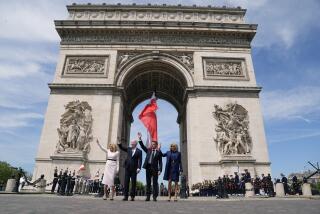David Cameron, Nicolas Sarkozy visit post-Kadafi Libya
- Share via
Reporting from Tripoli, Libya — British Prime Minister David Cameron and French President Nicolas Sarkozy paid a historic visit Thursday to the Libyan capital, praising the nation’s revolution, urging fugitive former leader Moammar Kadafi to surrender and sending a not-so-subtle message to Syria that room for autocratic rule was shrinking in the region.
Both nations played a leading role in the withering NATO air campaign that was essential in toppling Kadafi’s rule after more than four decades in power. The two leaders were the first foreign heads of state to visit Libya since Kadafi was ousted from the capital last month and went on the run.
“This does go beyond Libya; this is a moment when the Arab spring can become an Arab summer,” Cameron told a news conference with Sarkozy and leaders of Libya’s transitional government.
Sarkozy used the opportunity to chastise the authoritarian government of President Bashar Assad in Syria, where security forces have used tanks and troops to combat a months-long protest movement.
“I hope that one day young Syrians can be given the opportunity that young Libyans are now being given,” said Sarkozy, speaking with the other leaders at a Tripoli hotel.
The site of the media brief was subject to intense security. Attack helicopters flew overhead, roads were closed and armed troops of the transitional government stood guard along the main coastal road.
U.S. air power and intelligence-gathering capabilities were also key in the ongoing air operations over Libya, but the Obama administration has opted to let European nations take the lead role in the alliance campaign.
Both European leaders said Kadafi, who has urged his followers to fight a guerrilla war, should surrender.
“Let us be clear: This is not finished, this is not done, this is not over,” Cameron said.
The NATO-led air mission over Libya will continue, they vowed, tying the aerial attacks to the fact that Kadafi remains at large and his loyalists still control or wield influence in large swaths of Libya.
“Kadafi has money, he has gold, he can buy mercenaries and he is still a threat, and therefore our mission is not finished,” Sarkozy said.
The French president emphasized that there was “no hidden agenda” in the European air campaign, countering criticism that participating nations may be seeking oil deals and other contracts in the new Libya. “This was a just cause,” Sarkozy said.
The head of Libya’s transitional government, Mustafa Abdul Jalil, said that nations that assisted Libya in its struggle against Kadafi could expect “priority within a framework of transparency.”
There has been speculation that some nations that were slow to endorse the anti-Kadafi uprising, notably China and Russia, might lose out in future business deals with Libya.
Many nations, including France, Britain and the United States, along with Russia, China and Turkey, had business interests in Kadafi’s Libya. The transitional government chief said that all contracts would be respected, if they had not been tainted by corruption.
More to Read
Sign up for Essential California
The most important California stories and recommendations in your inbox every morning.
You may occasionally receive promotional content from the Los Angeles Times.












